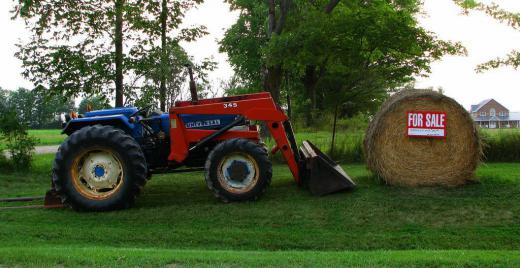Several factors affect used tractor prices, from the total engine hours to the tread life left on the tires. There are also optional equipment add-ons that affect used tractor prices, such as weights, cabs and air conditioning. Typical factors that also affect cost include the age of the tractor and the size of the engine. The tractor's transmission type, front-end style and buckets can all affect prices. The price of a used tractor is also impacted by the tractor's condition and manufacturer.
Unlike an automobile buyer who is interested in the mileage of a used vehicle, a used tractor buyer is commonly interested in a tractor's total hours of running time. The hours on a certain piece of equipment can drastically affect the price. Another thing that will impact used tractor prices is the type of fuel the tractor burns or operates on. Diesel tractors commonly sell for much more than gasoline-powered versions because most diesel engines will operate trouble-free for a much greater period of time than a gasoline tractor. The diesel versions are also commonly more powerful and reliable than a gasoline tractor.

Tires are a common feature that are used to help set used tractor prices. Newer tires will raise the price of a tractor, while worn tires typically detract from the price of a used machine. Tires are also used to judge the veracity of an engine hour gauge. A tractor that claims to have very low engine hours may be equipped with nearly worn-out tires and may be viewed as a risk to purchase. Extras and options, such as weights, stereo and satellite-guided capabilities, can drive used tractor prices up.

Climate-controlled cabs and on-board computers will often bring greater prices than tractors not so-equipped. Hydraulically-powered buckets, dual tires and the amount of power the engine produces are all factors contributing to used tractor prices. Features, such as the front end configuration — as in tricycle or wide front end design — will affect the pricing of a used model. The transmission-type of a tractor will also impact the price of a used model, with a hydrostatic transmission often costing more than a typical clutched transmission.
The specific manufacturer of the tractor also affects the pricing of used tractors. Some manufacturers are simply more popular. Thus the used models from the manufacturer commonly sell for more than that of a similarly equipped competitor's model.
